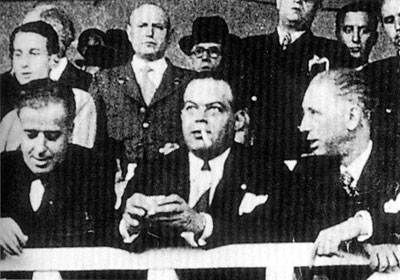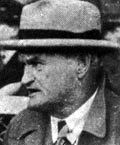|
O’Connell seems to have been sufficiently inspired by
Pentland’s example of survival in the midst of adversity
to want to follow in his footsteps. An opportunity came
when the Englishman, nicknamed El
Bombín because of the bowler hat he wore, was poached
by the longer-established rival Athletic Bilbao in 1922,
leaving the managership of Racing
vacant. O’Connell impressed the club’s owners by
building on Pentland’s methods, encouraging the native
skills of dribbling with the ball, while training his
defenders in the long up-field passing and crosses that he
had learnt as a young player in Ireland
and Britain. He also placed great emphasis on fitness, discipline and
team work. This represented a cultural shift for many
Spaniards, on and off the pitch.
The seven years O’Connell spent at Racing
were formative years for the club. O’Connell’s own
experience as a defender proved hugely valuable when
during the 1926-27 season a new off-side rule was
introduced. He trained his defenders in moving forward so
as to isolate the other side’s attacking forward and
leave him offside when gathering the ball from a pass. His
main achievement however was in establishing Racing’s
rightful claim to be treated as an important football club
by its loftier rivals. Thanks to O’Connell, Racing
was able to successfully challenge an attempt by a
small group of clubs led by FC Barcelona, Real Madrid and
Athletic Bilbao to restrict the access of smaller clubs to
the new Spanish League. The so-called ‘minimalists’
wanted the Primera
Liga to be composed only of them and three other
clubs, Real Sociedad, Arenas and Real Unión de Irún. The
‘maximalist lists’ made up of all the other smaller
Spanish clubs organised a parallel championship which Racing
won. A subsequent compromise agreement led to the
creation of an expanded Primera
Liga in which Racing
was among those allowed to play.
Having secured Racing’s
place in top Spanish football, O’Connell spent two
seasons as manager of Real Oviedo in Asturias, once again succeeding Pentland and helping to mould the
newly created club into a competitive sporting
institution. O’Connell then spent a further three
seasons at Real Betis in the Andalusian capital of Seville.
The years 1929-1935 were marked by growing political
and social tension in Spain. O’Connell, or Don
Patricio as he was now popularly referred to, had
become accustomed to his expatriate status, and was
seemingly content to maintain a distant if dutiful
relationship with the family he had left in England,
sending them regular bank transfers drawn from the income
he earned as manager. He spent these turbulent years in
regions of Spain with a strong tradition of industrial and rural militancy
that surfaced in the run-up to the Spanish Civil War.
O’Connell had already moved south when the Asturian
miners and other workers staged an attempt at a
proletarian revolution, which was brutally repressed by
army units led by an ambitious young Spanish officer
called Francisco Franco. News of the repression of his
former fans in Oviedo would have had for O’Connell echoes of Irish history.
This would also have been the case with the stark social
divisions he encountered in Andalusia, a region of Spain sharply divided between hugely rich and often absentee
landowners and poverty-stricken rural workers. It was in
Andalusia, however, that O’Connell had his first direct
experience of the thin line that separated Spanish
football from Spanish politics.
Betis was one of two clubs in the city of
Seville. The other, named after the city, was considered an
eternal rival for reasons deeply rooted in the class
divisions that plagued the capital. In 1909, Betis was
formed by a break-away faction of members of Sevilla FC
who were angered by the social exclusiveness of the
club’s management. The split occurred after a majority
on Sevilla’s governing board had refused to approve the
signing of a young worker as a player on the grounds that
he did not have the social standing that was expected for
entry into the team. From then on, Sevilla’s reputation
as ‘el club
de los señoritos’ (the toffs’ club) became engrained in local popular
mythology, with Betis taking pride in being the club that
genuinely represented ‘el
pueblo’ (the people), while at the same time enjoying royal patronage.
Under O’Connell, Betis achieved considerable success
on the field. After becoming the first Andalusian club to
qualify for the Primera
Liga, Betis went on to win the championship on the 28
April 1935 with a crushing 5-0 victory over Racing.
The night before the game, which was played in Santander, O’Connell visited the Racing
squad at a hotel where they were staying. Racing
was down in the league table and had no chance of
winning the championship, regardless of the outcome of the
game. By contrast, Betis was at the top of the table but
had to win if it was not to be overtaken and lose the
championship to its main rival that season, Real Madrid.
O’Connell shared a drink or two with his former club
colleagues and then suggested that they might do him a
favour he would be foolish to refuse: ‘You’ve got
nothing to play for tomorrow. You won’t kill yourselves
to beat us will you?’ he asked. The answer from one of
the leading players was unequivocal: ‘I’m sorry, mister,
but Madrid wants us to win. Our president, José María Cossio, is a
Madrid fan himself and is offering us 1,000 pesetas
per (Racing) player if we win.’
It was perhaps just as well that O’Connell left the
matter to rest there, for to have pursued the conversation
with an offer of a counter bonus (or bribe) may have led
to another abrupt closure on his career, and a critical
chapter in the history of Spanish football would have
subsequently turned out very differently.
|

Josep Sunyol (centre)
member of the Catalan parliament and President
of
FC Barcelona until his execution in 1935 by
Francoist forces
(Jimmy Burns, 'Barça, A People’s Passion'.
London: Bloomsbury, 1999)
|
For we now enter what undoubtedly represents the most
extraordinary period in O’Connell’s life, when, after
a short holiday in his native Ireland, he returned to
Spain, this time as manager of one of the world’s great
sporting institutions, FC Barcelona. The timing of his
arrival in the Catalan capital and his adherence to one of
its totemic nationalist organisations suggests that behind
O’Connell’s ambition to manage one of Europe’s leading teams lay the politics of a man prepared not
to remain indifferent to the Spanish Civil War.
For O’Connell took up the management of FC Barcelona
after Catalonia had emerged as one of the regions in Spain
where there was a significant proportion of the population
determined to defend the Spanish Republic from the
right-wing plotters and their friends in the military. He
had arrived in Barcelona in the summer of 1935, days after the football club had
elected as its president Josep Sunyol, a parliamentary
deputy for the left-wing Catalan nationalist party, Esquerra
Republicana de Catalunya. In February 1936 a
Popular Front electoral coalition between Communists and
Socialists was swept to power, bringing Spain a step closer to the brink of war, with sectors of the
military pushing ahead with plans for a coup.
The uprising took place on 18 July 1936.
|


